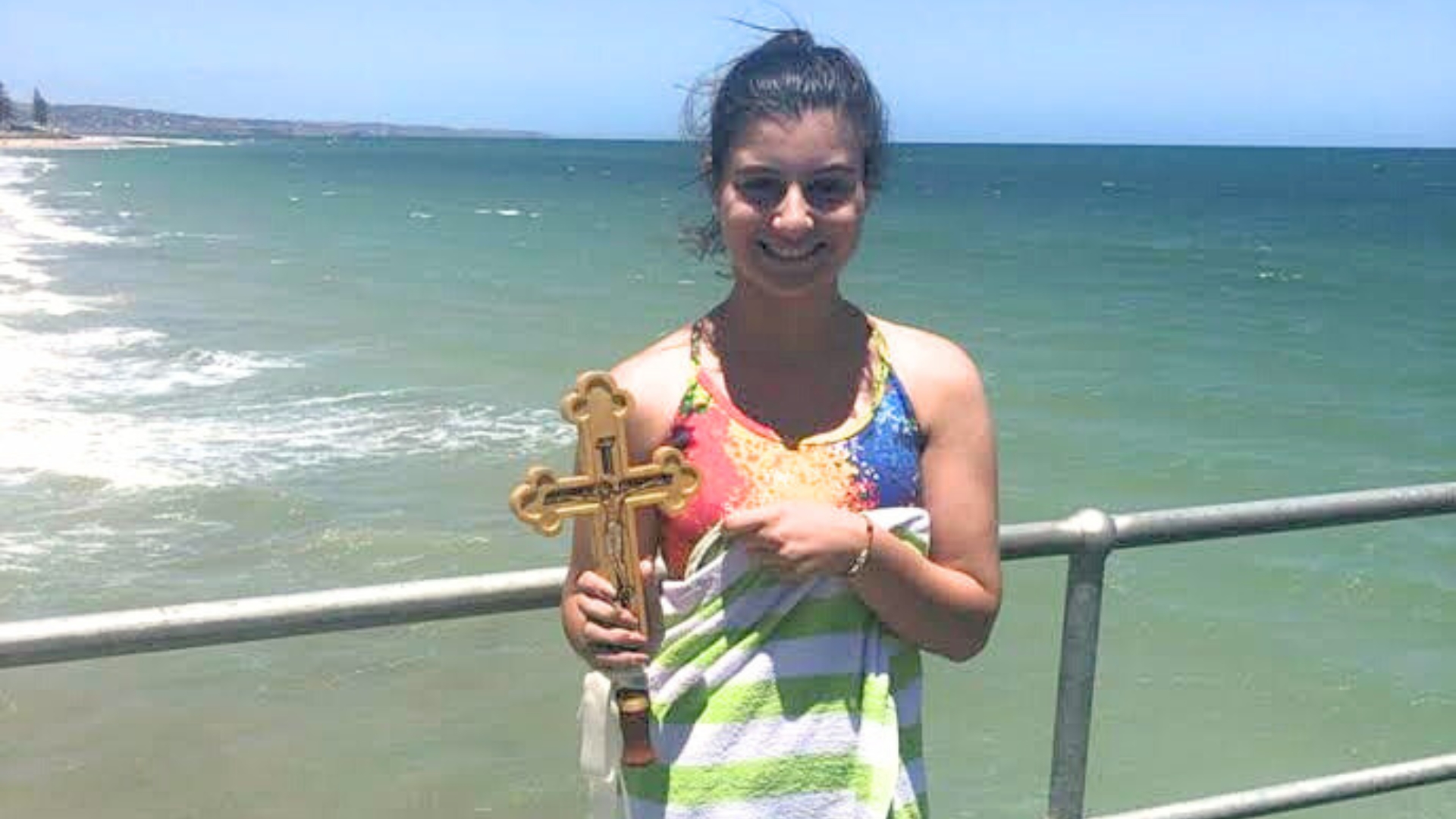By Mary Sinanidis
“I didn’t know whether I would be permitted to dive for the cross,” Victoria Paneras told The Greek Herald, remembering the day she plunged into Glenelg’s chilly waters.
On that clear blue sunny day, the 17-year-old became the first woman in South Australia to retrieve the cross on Epiphany Day 2019.
She had woken up with an inexplicable urge to join the male divers.
“I told my family and they were supportive, encouraging me to go for it,” she said.
“When I arrived and asked if I could join the other swimmers, those present had to get a second opinion before this was allowed.”
While Paneras was able to dive in Glenelg in 2019, at the 2023 Epiphany Day celebration at Port Melbourne, the two people manning the registration desk would not accept female participation.
“They are not allowed,” The Greek Herald was told in hushed-up tones, no further explanation given. It is uncertain whether the organisers were acting of their own accord or following the directions of local religious leaders.
The imposition of a male-only rule was arbitrary, especially bearing in mind the Greek Orthodox Archdiocese of Australia’s repeated declarations that there has never been a canon against women diving for the cross provided “they are modestly dressed,” This dress code hopefully also applies to the attire of the male swimmers.
The dive itself, along with the release of the doves by local dignitaries on the male-dominated VIP stands, are recent 19th century additions to the Blessing of the Waters ceremony.
Early church fathers established Epiphany Day in the third century – sans the swimming component. They wanted Theofania (Epiphany Day), meaning the “appearance of God” or “divine manifestation,” to mark the end of the Christmas season. On this day, Greek Orthodox Christians celebrate the baptism of Jesus in the Jordan River emphasising the moment Christ revealed himself as God’s son to the whole of humanity.

In modern times, the deeper message of this pivotal moment is overshadowed by the “fun” components of Epiphany Day. The annual paraphernalia includes attendance by local politicians cordoned off from the masses, live music, souvlaki, loukoumades, popcorn, animal petting, face painting, and other money-makers.
Then there are the chiselled oiled-up male torsos, glistening in the Australian sun, firm muscles flexing during warm-ups before the young men display their athletic prowess in a 117-year ritual that has fast become a competitive sport.
It is understandable why some religious leaders are anxious about adding bikini-clad women to the equation. Some United States parishes are even considering women-only dives to work around possible moral and safety risks in the battle to grab the cross. Alternatively, and this has not been discussed, the church may also consider introducing dress codes for swimmers of both genders because it is still a religious ceremony after all.
Victoria said she had wanted to challenge the status quo as a matter of faith and not feminism per se. She just wanted to experience the act of retrieving the cross, a symbolic baptism signifying spiritual renewal and cleansing.
She told the media present that she saw the dive as a “good omen” for her Year 12 studies as, typically, the catching of the cross is associated with good fortune and prosperity for the coming year.
True enough, Victoria continued her year with a successful result and followed her passion – teaching. She is currently finishing her education degree and Bachelor of Science while working at St George’s College.
What she had not expected was the surge of faith that rushed through her following the dive. Other divers, regardless of gender, also claim to have experienced this, a feeling they carry throughout their lives. Just a chance to participate is considered an honour.
“The dive strengthened my faith and I go to church a lot more now. I also feel closer to my heritage and even learn Greek dancing,” Paneras said, adding that she always wears the gold cross she was given on that day.
“When I caught the cross, most reactions were positive, and my priest and grandparents were happy for me. Some people, however, said it was wrong for a woman to catch the cross. At the time, I hardly noticed what people were saying because I was overwhelmed.”
Paneras acknowledges that while social norms may have been different just over a century ago, these male-dominated traditions, forged over time, aren’t carved in stone. She said that the exclusion of women from such events isn’t based on biblical references but has more to do with outdated notions of female frailty and societal roles.
“I am happy to see more girls experiencing the dive and hope that I have helped contribute to this,” Paneras said, adding that she would like to meet with more women divers to share what the religious experience meant to them. “My younger sister wants to participate too, and I wholly encourage this.”
Luckily her sister is in Adelaide and not Port Melbourne where last year this was not allowed. Instead, only the boys competed and won and were blessed for it, the male dignitaries present released the doves and the girls made loukoumades.
